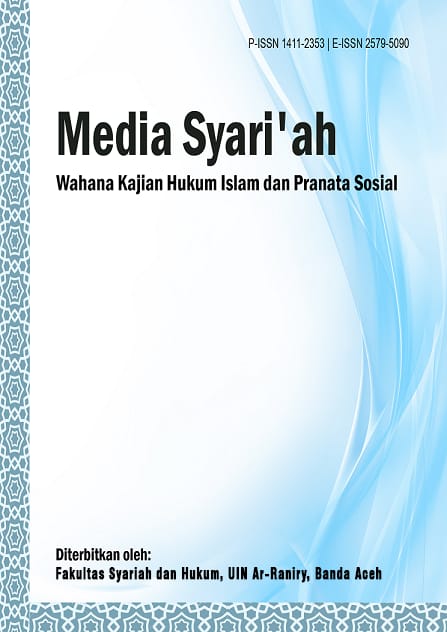Pencegahan Jarimah Khalwat di Kota Sabang
DOI:
https://doi.org/10.22373/jms.v21i2.2491Keywords:
Hukum Jinayat, Kendala, Jarimah KhalwatAbstract
Abstrak: Pasal 18 huruf (b) Undang-Undang Dasar Negera Indonesia Tahun 1945 menjadi landasan hukum tertingi pengakuan wilayah Aceh sebagai daerah Syariat Islam, konsep hukum Islam mulai diterapkan, salah satunya mengenai Hukum Jinayat yang mana terdapat 10 (sepuluh) jenis jarimah yang termuat dalam Qanun Aceh No.6 Tahun 2014 tentang Hukum Jinayat. Didaerah Kota Sabang, khalwat merupakan jenis jarimah yang mengalami peningkatan tiap tahunnya. Berdasrkan hasil penelitian setidaknya terdapat 3 (tiga) faktor kendala efetivitas hukum jinayat di Kota Sabang, pertama hukum jinayat yang lemah dalam hal penjatuhan uqubat/sanksi terhadap pelaku jinayah khalwat (tidak memberikan efek jera), dan terhadap anak yang bermasalah dengan hukum jinayat dapat dieksekusi dengan hukuman cambuk didepan umum yang dapat mengakibatkan trauma terhadap anak dan mengganggu proses tumbuh kembangnya, serta subjek hukum yang kabur dalam qanun ini. Faktor kedua yang menjadi kendala personel penyidik Satuan Polisi Pamong Praja dan Wilayatul Hisbah Kota Sabang baru 1 (satu) orang, akibatnya proses penegakan hukum menjadi lambat, dan penyidik hanya menangani jarimah khalwat. Faktor ketiga belum terdapat ruang sel tahanan jinayah di Kantor Satuan Polisi Pamong Praja dan Wilayatul Hisbah Kota Sabang.
Abstract: Article 18 letters (b) of the 1945 Constitution of the Republic of Indonesia become the highest legal basis for the recognition of the territory of Aceh as the area of Islamic Shari’a and the concept of Islamic law came into force, one of which concerns jinayat law in which there are 10 (ten) types of finger which is contained in Qanun Aceh No.6 Year 2014 on Jinayat Law. In the region of Sabang, khalwat is a kind of jarimah that experience increase every year. Based on the result of research there are at least 3 (three) constraints factor of jinayat’s legal effectivity in Sabang City, firstly jinayah law which is weak in the case of sanction/uqubat imposition on khalwat penpetrator (no deterrent effect) and to the chilad with problem jinayat law can be executed with public canning that can lead to trauma to children and disrupt the process of growing up, as well as the legal subjects that are vague in this qanun. The second factor becomes the personal obstacle of the investigator of the Civil Service Police Unit and the Wilayatul Hisbah the new Sabang City 1 (one) person, consequently the law enforment process becomes slow and the investigator only handles khalwat fingers. The third factor has not been contained jinayah prison cell cell in police officers office police station and Wilayatul Hisbah Sabang City.
References
Dinas Syariat Islam, 2015,Qanun No.6 Tahun 2014 Tentang Hukum Jinayat.
Dinas Syariat Islam Nanggroe Aceh Darussalam. (2005). Himpunan Undang-undang, Keputusan Presiden, Peraturan Daerah/Qanun, Instruksi Gubernur, dan Edaran Gubernur. CV. Hardyan.
Kaelan. (2004). Pendidikan Pancasila. Paradigma.
Marpaung, L. (2012). Asas-asas Hukum Pidana. Genta Publishing.
Marzuki, P. M. (1984). Penelitian Hukum. Kencana Prenada Media Grup.
Prasetyo, T. (2010). Hukum Pidana. Raja Grafindo Persada.
Soejono Soekanto. (2008). Faktor-Faktor yang Mempengaruhi Penegakan Hukum. PT. Raja Grafindo Persada.
Al-Yasa’Abubakar, A. (n.d.). Sekilas Syariat Islam di Aceh. Dinas Syariat Islam Propinsi Aceh.
Downloads
Published
Issue
Section
License
MEDIA SYARI'AH: Wahana Kajian Hukum Islam dan Pranata Sosial has CC-BY-SA or an equivalent license as the optimal license for the publication, distribution, use, and reuse of scholarly work. Authors who publish with this journal agree to the following terms:
1. Authors retain copyright and grant the journal right of first publication with the work simultaneously licensed under a Creative Commons Attribution-ShareAlike 4.0 International License that allows others to share the work with an acknowledgment of the work's authorship and initial publication in this journal.
2. Authors are able to enter into separate, additional contractual arrangements for the non-exclusive distribution of the journal's published version of the work (e.g., post it to an institutional repository or publish it in a book), with an acknowledgment of its initial publication in this journal.
3. Authors are permitted and encouraged to post their work online (e.g., in institutional repositories or on their website) prior to and during the submission process, as it can lead to productive exchanges, as well as earlier and greater citation of published work (See The Effect of Open Access).
You are free to:
Share — copy and redistribute the material in any medium or format.
Adapt — remix, transform, and build upon the material for any purpose, even commercially.
The licensor cannot revoke these freedoms as long as you follow the license terms.
All papers published in MEDIA SYARI'AH: Wahana Kajian Hukum Islam dan Pranata Sosial are licensed under a Creative Commons Attribution-ShareAlike 4.0 International License.




.png)


.png)
.png)
.png)



